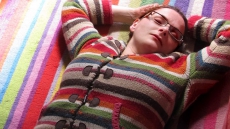Having a low self-esteem related to one's weight and keeping food visibly available around the house, outside the kitchen, may increase your likelihood of being obese, says a new research.
Multiple metabolic and genetic factors contribute to obesity, but the home is a logical place to consider in efforts to improve health, the researchers noted.
"Effects of the home environment and psychosocial factors haven't been examined together in previous studies," said Charles Emery, professor of psychology at the Ohio State University and lead author of the study.
The study focused primarily on determining whether the home environment -- architectural features and food storage and availability -- was associated with obesity, but also measured a number of psychological factors. While architectural features had no relationship to obesity status, several food-related findings did.
People in the study who were obese kept more food visible throughout the house and generally ate less-healthy foods, such as sweets, than non-obese research participants.
"The amount of food in the homes were similar, but in the homes of obese individuals, food was distributed in more locations outside the kitchen," Emery noted.
"That speaks to the environment being arranged in a way that may make it harder to avoid eating food," Emery pointed out.
In addition, obese participants reported significantly lower self-esteem related to their body weight than did non-obese people. Obese participants also reported more symptoms of depression.
The study involved 100 participants between the ages of 20 and 78. Fifty were not obese, and the 50 obese participants had an average body mass index (BMI) of 36.80 (a BMI of 30 indicates obesity).
The study was published in the International Journal of Obesity.





